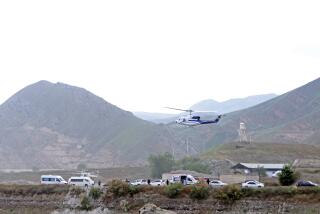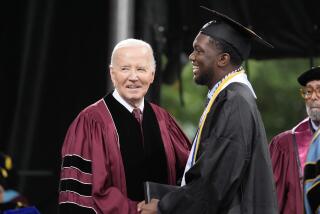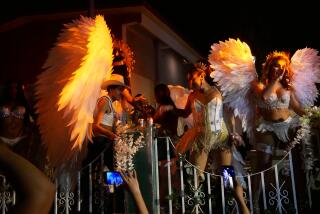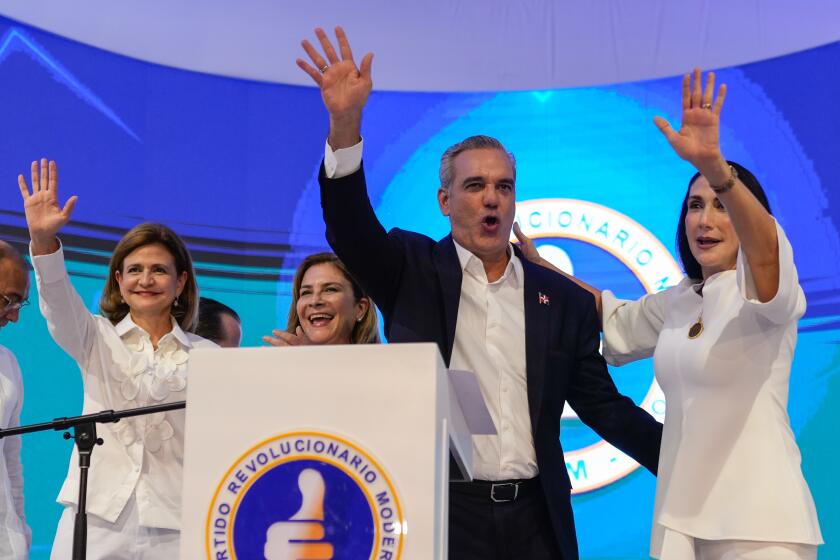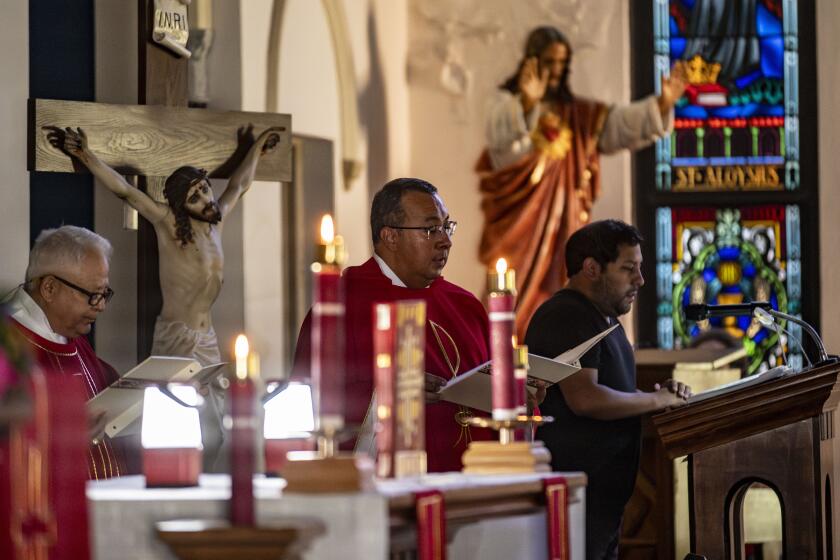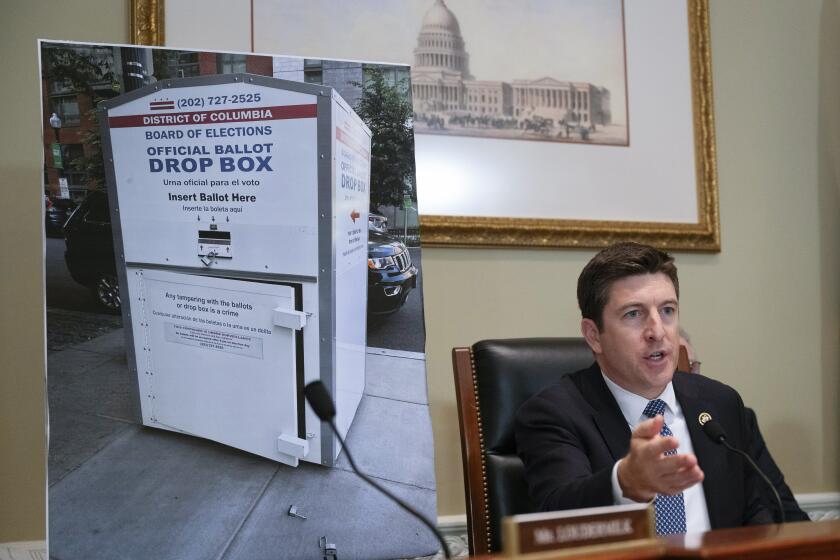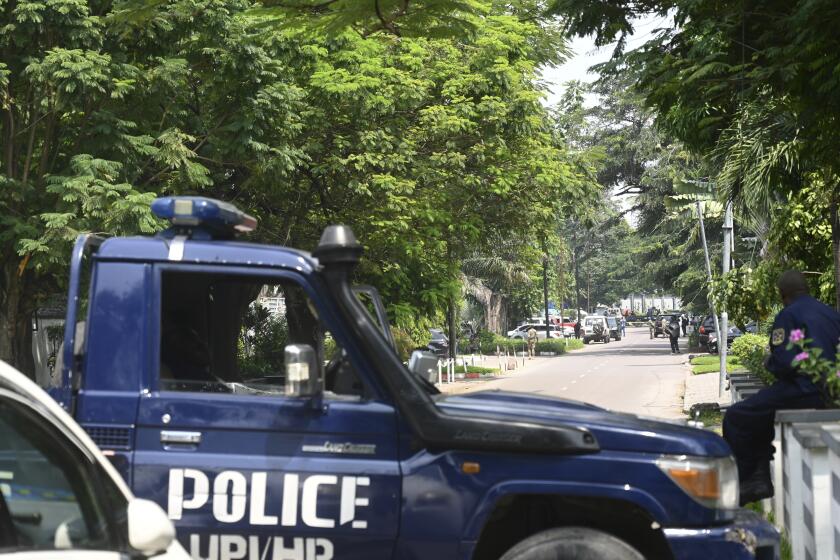An Antidote to Men’s Most Private Pain and Fears : Healing: For testicular cancer patients, Dr. Christy Russell’s compassion is a welcome bonus to her top oncology credentials.
Nearly three years ago, Larry Bailin pulled a groin muscle while lifting weights.
“When the swelling went down,” he says, “that’s when I knew I had a problem.”
Bailin felt a lump on his left testicle, and although he was concerned enough to see a urologist, he wasn’t alarmed until an ultrasound test showed that the lump was most likely cancerous. Told that he would need an oncologist, Bailin and his wife, Adrian, interviewed four--with mixed results.
The first said Bailin wouldn’t need chemotherapy, which didn’t gel with what he had read about testicular cancer--that chemo was considered essential.
So he went to a second oncologist, who told Bailin that he had to start chemotherapy right away--or he was going to die.
“The guy scared me so bad, we just walked out,” Bailin says.
The third was OK, but before Bailin signed on, a friend told him to check out the USC/Norris Comprehensive Cancer Center in East Los Angeles because of its reputation. There he met Dr. Christy Russell.
“We had a good feeling about her from the beginning,” says Bailin, 37, who owns an auto repair shop in Reseda. “She was warm and compassionate. And that’s what you need when you’re down like that. . . . She pulled me through it. She really did.”
Testicular cancer generally strikes men in their late teens to mid-30s. And Russell, 39--among a handful of female oncologists--has made it her business to fight this disease. Her caseload is one of the largest in the country.
Russell says she chose to focus on testicular cancer because she finds the disease and its victims compelling.
“It has a lot to do with the youth of the patients,” she says. “These men are at a time in their lives when they’re developing careers, relationships and families and, suddenly, it all falls apart.”
Although Larry Bailin and others say they readily accepted a woman as their oncologist (“At that point I had lost all vanity,” Bailin says. “That she was a woman didn’t even enter my mind.”), Russell says it’s often difficult for young men to express their fears to her about testicular cancer--issues such as sterility, physical appearance and sexual impairment.
“I think if I give them time to talk about these fears and talk about what their lives are about, and as long as I share with them some of my life and leave myself a little bit open to them emotionally, I think there’s enough of a connection,” she says.
Dr. Valeria Israel, an oncology fellow at the Norris Center, says Russell has a talent for putting her patients at ease. “I think she really sees their lives and their dilemma from their perspective. She’s so in tune with what they’re going through that it’s like the ultimate empathy. . . . They love her. I mean literally love her.”
Paul Carroad, a former patient and an administrator at Cal Tech in Pasadena, echoes the praise: “Each of us feels like she’s our own special doctor. How she gets that across to everybody, individually, I don’t know. But she does.”
David Apolskis, a USC senior and football center for the Trojans, remembers leaving the Norris Center with his mother after his final session of chemotherapy. “I saw Dr. Russell walking toward us. And I just starting smiling and crying and I gave her a big hug. Yeah, she had tears in her eyes, too.”
*
Dr. Christy Russell works out of a small office at one end of a maze of cubicles at the Norris Center. There aren’t many personal touches in her space except for a potted plant, an unhung poster print and a warm eight-pack of Diet Coke. With a schedule full of patient appointments, teaching sessions, hospital rounds, staff conferences and committee meetings, Russell doesn’t spend much time there except to return calls, type a few notes and retrieve another soda.
Still, Russell has a way of undercutting much of the urgency and seriousness of her work with a quip or two. Pressed about her rapport with her male patients, for example, Russell says she grew up with three brothers, “so maybe it’s just that I can communicate with men who are unreasonable at any age.”
Russell, a native of Pennsylvania--and a graduate of the University of Pittsburgh and the Medical College of Pennsylvania--says she found her niche with testicular cancer 10 years ago. She had just arrived in Los Angeles with her husband, architect Jeffrey Acker. She had come to serve a three-year fellowship in oncology at the Norris Center and ended up working closely with Dr. John Daniels, who specialized in testicular and other urological cancers.
Russell had not planned to stay in Los Angeles. But she says it was difficult to turn down a faculty position at USC that also provided for a private practice at the Norris Center. Equally important, she says, was the chance to work with indigent and uninsured patients across the street at County-USC Medical Center.
“It’s absolutely fulfilling for me to have an opportunity to move between those two worlds, which are day and night in terms of what’s available to patients diagnosed with cancer.”
Patients at the Norris Center, Russell says, are privately insured and most have had the disease diagnosed in the early stages. At the county hospital, a large number of patients are uninsured and often the disease has already spread to other tissues. She says these men would die without access to treatment.
“Whether our taxpayers want to pay for that or not, it’s not for me to decide. If I see a patient with curable cancer, I don’t care where the resources come from. It’s my job to cure them.”
Although the overall survival rate for testicular cancer is relatively high, Russell says these men still under go rigorous treatment.
“The surgeries are horrendous and the chemotherapy can be extraordinarily toxic,” she says. The surgeries involve the removal of the diseased testicle and, in most cases, a five-hour surgical inspection of the lymph nodes for signs of the cancer.
Removing one testicle doesn’t hinder sexual function (the remaining testicle is capable of producing all the sperm and hormones a man needs), but until a few years ago, the lymph node surgery left patients unable to ejaculate. Today, Russell says, surgical advances have reduced the scope of the operation, enabling more experienced urologists to spare the nerve pathways that control ejaculation. But there’s no guarantee.
Chemotherapy, which can be administered before or after surgery, is another concern because it can cause sterility. Although Russell says most men regain their fertility within a few years, there’s no guarantee of that either. Some patients deposit sperm at a sperm bank as insurance.
*
Russell also treats some patients with bladder and prostate cancer. Moreover, she’s associate director of the USC/Norris Breast Center and works extensively with women with breast cancer.
In March, she’ll begin serving a two-year term at the Norris Center as chief of staff. Her responsibilities will include serving as liaison between the medical staff and the hospital board of trustees.
Dr. John Daniels says that those selected as chief of staff are highly regarded by their peers--and not just for their skills as a physician. Daniels says there’s a “great deal respect for (Russell’s) common sense and compassion.”
Compassion, though, is not without limits, Russell says. She acknowledges that she has to organize her schedule better or cut back a bit.
“I can get very lost doing this work and lose my sense of time. Sometimes I have to remind myself I have another obligation and another place to be--which is home.”
Russell and her husband have two sons, Christopher, 7, and Alexander, 5.
“I regret getting home at 7 or 8 and having only an hour to spend with them before they’re bundled off to bed.” She says they’re too young to be jealous of her time at work, “but I think there’s a perception that I’m not home a lot. And I think it’ll get worse.”
She tries to be at her sons’ soccer games every Saturday and says sitting down with her family in the morning and on weekends is “my best time.”
She tries not to take her work home. “But in the middle of the night,” she says, “sometimes it’s there.”
Testicular Cancer
As cancers go, testicular cancer is not that common. According to the National Cancer Institute, 3 in 1,000 men develop the disease. The American Cancer Society projects 6,600 new cases for 1993. (By comparison, 165,000 cases of prostate cancer are expected for 1993.)
Testicular cancer generally strikes white men, 19-35 years of age. The disease is less prevalent among Native Americans, Asians and Latinos, and rarely shows up among African Americans.
Infants who weighed less than five pounds at birth or had testes that failed to descend into the scrotal sac--a condition known as cryptorchidism--have a greater incidence of testicular cancer in adulthood. Testicular cancer is highly curable because of advances in surgery and chemotherapy. The overall survival rate, according to the NCI, has risen dramatically from 63% in the early 1960s to 93% in the mid-1980s.
More to Read
Start your day right
Sign up for Essential California for news, features and recommendations from the L.A. Times and beyond in your inbox six days a week.
You may occasionally receive promotional content from the Los Angeles Times.
